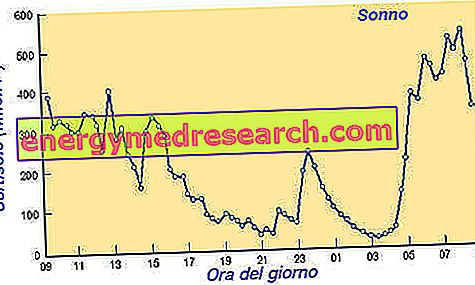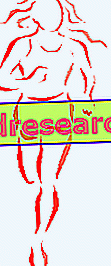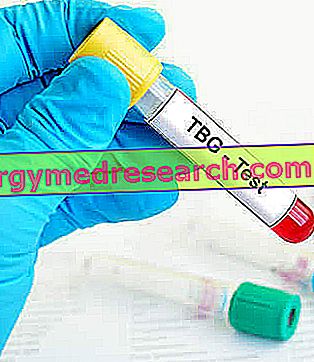How it is produced, how it acts, how to control its secretion
What is that
Cortisol is a hormone produced by cells of the adrenal fasciculate in response to the pituitary hormone ACTH. ACTH is therefore the precursor of cortisol.
Cortisol is often called "stress hormone" because its production increases, precisely, in conditions of severe psycho-physical stress, for example after extremely intense and prolonged physical exercises or surgery.
Functions
With its action, this hormone tends to inhibit non-essential body functions in the short term, guaranteeing maximum support for vital organs.
For this reason cortisol:
- induces an increase in cardiac output
- increases glycaemia, increasing hepatic gluconeogenesis (conversion of alanine to glucose), stimulating glucagon secretion and reducing the activity of insulin receptors
- reduces immune defenses thus reducing inflammatory reactions (phospholipase A2 inhibition)
- decreases the synthesis of collagen and bone matrix, accelerating osteoporosis
- promotes protein catabolism (stimulates protein conversion to glucose and glycogen synthesis)
- promotes the mobilization and use of fatty acids, but in some districts stimulates lipogenesis
An increase in circulating cortisol also occurs in the event of prolonged fasting or incorrect eating habits. In fact, skipping breakfast and / or eating a lot in one meal a day favors hypercortisolism (the increase in the production of cortisol).

Daily variation of plasma hormone levels. Note the main night wave; before awakening 50% of the total daily cortisol is secreted.
Values
AVERAGE VALUE * OF ACTH IN THE BLOOD: 10-70 ng / l
AVERAGE VALUE * OF COURAGE IN BLOOD:
- adult (at 8:00) 100-200 micrograms / l or 250-550 nmol / l;
- adult (at 20:00) 100 micrograms / l;
- child under 10 years: 50-100 micrograms / l
hypercortisolism
Effects of Cortisol Excess
Cortisol is a hormone that must be kept under control to avoid unpleasant consequences. The following are the main conditions caused by an excess of this hormone.
- Hypertension
- Hirsutism and alopecia
- Truncular obesity and striae rubra
- Muscle weakness

- Low libido
- Edema
- Gibbo
- Recurrent infections
- Altered glucidic tolerance
- Cute thin facies
- Osteoporosis / fractures
- Headache
- Depression
- Acne
- dyslipidemia
- Delayed healing of wounds
- Hypoprogesteronism and associated disorders (in women)
Cushing's disease: pathology due to an overproduction of cortisol. Causes characteristic redistribution of body fat, loss of muscle mass, hypertension, capillary fragility, thinning of the skin, difficulty in healing wounds, osteoporosis, immunosuppression, secondary diabetes and psychosis.
Physical Activity and Cortisol
The critical level of exercise that causes a substantial increase in cortisol secretion is approximately 60% of VO2max.
Its secretion is related to the duration and intensity of exercise, the more these factors increase and the greater the amount of secreted cortisol. Note the increase in ACTH already in the pre-race period, caused by the psychological stress of competition.

NB: the corticosurenal response to sporting activity is enhanced by fasting and psychological stress, while it is reduced by food ingestion.
We also remember that glucocorticoids:
- stimulate protein catabolism, accelerating the degradation of muscle myofibrils (more evident effects in resistant fibers or type II, present in high percentage in the muscular masses of the lower limbs)
- increase the activity of glycogen synthase (accumulation of glycogen)
- stimulate the feeling of hunger
- they favor the deposit of fat in the abdominal region
To keep cortisol levels under control it is good to consume small meals in calories, but frequent (5 or more per day). We also recommend starting the day with an abundant breakfast and favoring the intake of complex carbohydrates such as oats, cereals without sugar, wholemeal flour and their derivatives. In training, then, it is important to allow yourself the right periods of rest, since the parameters "intensity" and "volume" in general are not expendable, being - if well calibrated - the basis for the phenomena of adaptation and improvement of athletic performance . In other words, cortisol must not become a device to train less in fear of its catabolic effects that become concrete and predominant in the organism's overall homeostasis only when the stresses are multiple and / or particularly intense and / or perpetuated over time.




